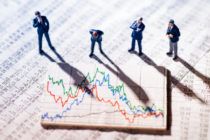The MSCI Emerging Markets Index has outperformed all other equity markets over the past 12 months, returning almost 25% in euro terms. And this outperformance is set to continue, according to the majority of fund buyers in both Norway and Belgium.
When we asked the audience at Expert Investor forums in Oslo and Brussels last week, there turned out to be an overwhelming consensus: a majority of delegates at both events said they expected emerging market equities to deliver the best performance of all mainstream asset classes over the next 12-month period. European equities were a distant second, gathering about a third of the vote on both occasions, meaning that other asset classes such as US equities and emerging market debt received almost no votes.

But will EM equities continue to outperform? Investors partly have the answer to that question in their own hands, according to Alexis Freyeisen, a global emerging markets specialist at UBS Asset Management.

“The bulk of inflows are portfolio flows from foreigners. If we have one or two more years of strong inflows, that would drive multiples much faster than earnings growth.” And that would obviously be good for returns.
Investors are still underweight
“But this requires a benign rate environment,” adds Freyeisen. “Higher rates would be one threat. If we had a strong pick-up in inflation in the US, that would be a negative scenario.”
Despite the strong inflows into EM equities this year, investor allocations to the asset class are still below their long-term average. According to data from the Institute of International Finance (IIF), investors have an average portfolio allocation of 14% to emerging market stocks now, which is still two percentage points below the post-financial crisis average.







